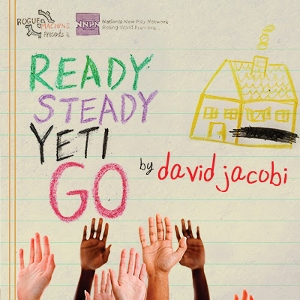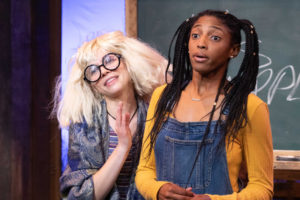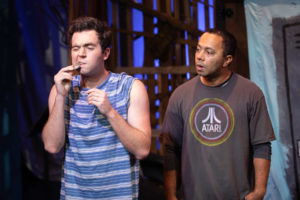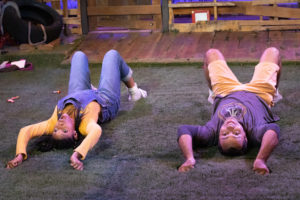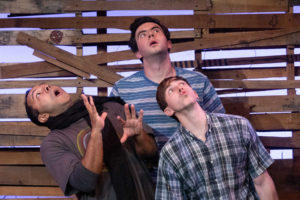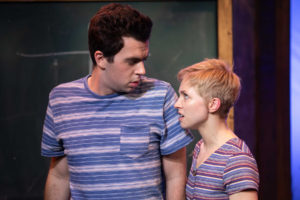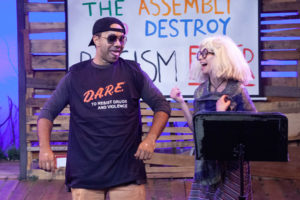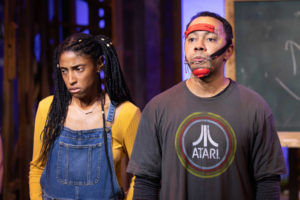GRAFFITI THAT ASKS PERMISSION
Carly Uhlenbeek (Jasmine St. Clair), an African American suburban seventh grade girl, seeks answers in playwright David Jacobi’s Ready Steady Yeti Go, a Rogue Machine production that is part of the National New Play Network’s rolling world premiere program. She assembles her friends to reenact the events of a recent hate crime, not only to understand what happened, but to figure out which was worse, the crime itself (someone paints the “N” word on Carly’s family’s home) or the hideous, if well-intentioned, aftermath that leads to her town organizing “The Assembly to End Racism Forever,” putting Carly front and center as an unwilling symbol of the supposed power of community to heal.
To recreate the story, the kids meet in a cartoon-like secret hideout in the woods. Adult actors play the kids. They also play the kids acting as their own teachers and parents. There is a spirit of improvisational play at work, and between each reenacted segment, one or all shout out, “Ready, steady, yeti, go,” to move the group along to the next event. Sometimes the call is a happy or funny reminder to keep going; other times it is a way of avoiding getting too deep into sadness and confusion.
Jasmine St. Clair is tender and funny. She brilliantly recreates a dinner scene between Carly and her parents, playing all three characters with keen observational humor that reveals a deep understanding of how we all have two or three conflicting motivations behind much of what we say to one another. There’s a bit of meta comedy that gets us there, when at first, a white actress starts playing Carly’s mother, applying broadly racial strokes, and Carly takes over, taking control so she can give voice to her whole family.
A romantic friendship blossoms after the crime, as Carly and Goon (Ryan Brophy) grow close. He is the white twin brother, a sort of bad seed, to the goody-goody Gandry (Kenney Selvey). Wikipedia Jones (Randolph Thompson), a geek from a nearby town, comes to crack the case. Goon is clearly hiding something about the hate crime, but it isn’t necessarily what people think. Goon’s loyalties are severely tested as real-life consequences slam into the fantasy of the town congratulating itself on its cultural sensitivity.
Ryan Brophy and Ms. St. Clair have a wonderful chemistry, and both play kids without any hint of condescension. There’s a great moment where she reveals she takes xylophone lessons instead of learning the piano because her pinkies are abnormally short. “You should probably just cut them off,” Goon says. “Yeah, I know,” she replies. Everything we know about the bluster and search for identity of a middle schooler is right there.
Nonsensically, the town that has no budget to clean off the graffiti opts instead to paint a mural on the Uhlenbeek home to cover the offending word. Goon is particularly dismissive. He thinks murals are stupid, like graffiti asking for permission — though he is tickled pink when his idea for the mural wins out. (I won’t spoil the reveal — but the central image of the mural is one of the funniest graphic images I have ever seen, at once sweet, stupid, wise, and deranged.)
David Jacobi writes from a place of understanding the chasm between intention and effect. He pokes fun at “The More You Know’¦” NBC’s public service announcement campaign from the 1990s that often took up issues of tolerance and diversity. Certainly, allowing Carly to take control from a white character playing her mother is a nod to that understanding. Yet over the course of the evening, the play inadvertently becomes the very thing it takes aim at: a white response to racism that makes white people feel better about themselves.
The perpetrator of the hate crime doesn’t harbor actual hatred or racism. The crime is revealed as an unthinking act of rebellion rather than anything with malicious intent. That feels like a cop out. The conception of Wikipedia Jones is particularly problematic. He is presented as an insufferable uber nerd whose gigantic orthodontic head gear leaves him slurping and lisping indecipherably. Randolph Thompson is quite funny as the mincing Jones, but I can’t help but notice that we are all being encouraged to seek common ground in laughing at someone who is different. And unhappily, the broad strokes call to mind Mickey Rooney’s turn as the Japanese upstairs neighbor in Breakfast at Tiffany’s.
After the show, I saw Ms. St. Clair welcome two African American members of the audience, “Black people!” she happily called out, “Finally! Some Black people!” The audience was mostly white, mostly liberal, mostly upper middle class or above. There was a generalized air of self-congratulation as we all awaited our applause for being so Woke.
photos by John Perrin Flynn
Ready Steady Yeti Go
Rogue Machine Theatre
Electric Lodge, 1416 Electric Avenue in Venice
Sat at 8; Sun at 7; Mon at 7 (dark on 6/10 & 7/8); Fri at 8 (6/7 & 6/14 only)
added performances on 11/26, 12/1 & 12/8 at 8)
ends on December 30, 2018
for tickets, call 855.585.5185 or visit Rogue Machine
